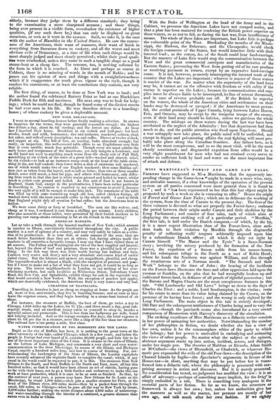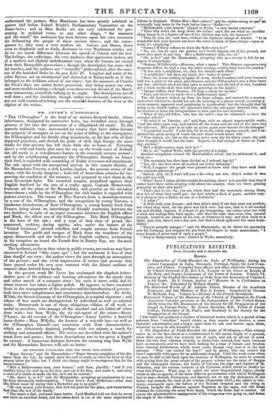MISS MARTINEAVS FOREST AND GAME LAW TALES. FRIENDS have suggested
to Miss Martineau, that the apparently im- pending change in the Game-have " might be made in a more wise, easy, and amicable manner, if a clear knowledge of the operation of tire present system on all parties concerned were more general than it is found to be" ; and it " has been represented to her that this last object might be promoted by such a work as she is venturing to offer." Hence the origin of Forest and Game Lam Tales; which are to delineate the working of the system, from the time of Canute to the present day. The first of the three volumes is devoted to what are properly the Forest-laws ; embrace the period between their origin under Canute and their abolition by the Long Parliament ; and consist of four tales, each of which aims at displaying the most striking evil of a particular period. "Merdhin," the first tale, is laid under the Danish conquest,—of which, by the by, it is a more cogent illustration than of the Forest-laws, since acci- dent leads to their violation by Merdhin through the disgraceful penalty of collecting wolfs' tongues arbitrarily imposed upon him by a subordinate Danish officer ; all which is duly set right by Canute himself. "The Manor and the Eyrie" is a Saxo-Norman story ; involving the misery produced by the formation of the New Forest, the expulsion of a Saxon noble from his manor-house, and his subsequent refuge in the North as a sort of Robin Hood; where he heads the Northern war against William, and dies through the treacherous arts of a Norman monk. "Tire Staunch and their Work" belongs to the time of John : the bearing of tire incidents on the Forest-laws illustrates the fines and other oppression laid upon the yeoman or franklin, on the plea that he had wrongfully broken up and cultivated forest-land, in defiance of all proofs of rightful possession ; but the Barons and Magna Charts are the most conspicuous features in this tale. "Old Landmarks and Old Laws" brings us down to the days of Charles the First : and a noble, Lord Southampton, is the victim ; rents for his estate to more than its value being claimed by the Crown, on the pretence of its having been forest ; and the wrong is only righted by the Long Parliament. The main object in this tale is strictly developed; Old Parr and the subsequent misfortunes of Charles being used to vary the interest,—though the patriarch seems also introduced for a very covert comparison of Mesmerism with Harvey's discovery of the circulation. The striking excellence of Miss Martineau as a didactic writer consists in her power of animating her authorities. Notwithstanding the number of her philosophies in fiction, we doubt whether she has a view of her own, unless it be the commonplace ethics of the party to which sbe belongs ; but her power is unrivalled in embodying and animating the views of other people. No matter what the subject or the opinion, abstruse argument starts up into action, incident, actors and dialogue, under her magic pen. The theories of Malthus or Ricardo, Adam Smith or M'Culloch—the views of Bloomfield, or Chadwick, or whatever Ho- meric pen expounded the evils of the old Poor-laws—the description of the Channel Islands by Inglis—the Spectator's arguments in favour of the House-tax—in short, anything that may be put before her is trans- formed into a didactic tale, where the philosophy is presented with sur- prising accuracy in action and discourse. But it is merely presented. No consideration has tested, no judgment has modified the view : it is an affair of advocacy—perhaps of something more implicit, for the brief is simply embodied in a tale. There is something very analogous in the essential parts of her fiction. So far as we know, the structure or framework is always her own ; but, unless her authorities give her the manners as well as the matter, her persons are mostly of her
own age, and talk much after her own fashion. If we rightly
understand the preface, Miss Martineau has been greatly indebted to matter laid before Friend Bright's Parliamentary Committee on the Game-laws ; and as Blue Books are not very celebrated for pre- senting in polished verse, or any other shape, " the manners and the mind," the authoress has been thrown upon her own resources for delineating the people of those ancient times ; and the conse- quence is, they wear a very modern air. Saxons and Danes, down even to shepherds and so forth, discourse in very Martineau strain; nor do we see much difference between the speech of Canute and the rest. The feelings, the sufferings, the very madness that oppression makes, are of a modern and slightly melodramatic cast, when the Saxons are ousted from their Hampshire possessions ; though the description has some skil- ful touches, and the outlaws are " woundily" philosophical, after the man- ner of the banished Duke in As you Like It. Langton and some of the other Barons are as sentimental and rhetorical at Runnymede as if they belonged to the brilliant school of our times: but the manners of Charles the First's days are rather better preserved, they being nearer our own, and more models existing,—though even these are not devoid of the Marti- neau mannerism, everybody talking as he ought. The descriptions are all well done; and the incidents, though rather too obviously contrivances, are yet well contrived to bring out the record,' features of the time or the objects of the writer.



























 Previous page
Previous page